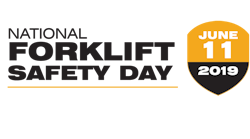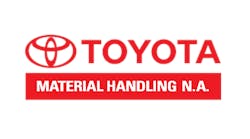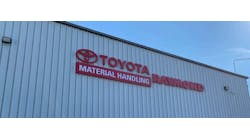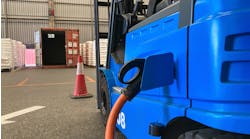National Forklift Safety Day 2019 Shines Spotlight on Tech and Training
The sixth annual National Forklift Safety Day (NFSD) will be held on June 11, 2019.
NFSD serves as an opportunity for forklift manufacturers to highlight the safe use of forklifts, the importance of operator training and the need for daily equipment checks. The event is centered in Washington, DC, with complementary events held throughout the country.
After completing forklift operator training, operator performance scores improved by 61%, according to the Occupational Safety and Health Administration (OSHA). The critical need for and proven effectiveness of training will be one of the key messages at NFSD, held by the Industrial Truck Association (ITA).
Clark Material Handling Promotes Forklift Safety
“We know that a safe operator is a trained operator and a trained operator is a safer operator, so we'll continue to promote it at every opportunity.” says Scott Johnson, ITA chairman and vice president of sales and marketing at Clark Material Handling Co. “Demand for lift trucks has been very strong over the last five years, making the need for continuous awareness for training a must.”
The importance of forklift operator and pedestrian safety through different stakeholders working together—manufacturers, dealers, employers and employees, as well as federal and state safety officials—continues to drive the decline in the overall accident rate.
In addition to the Washington, DC, national activities and those coordinated through the ITA and its member companies, Clark will also promote a special National Forklift Safety Day at its American headquarters in Lexington, Ky.
“The national event in DC, and all other local ITA member company events across the U.S., provide owners and operators, and anyone even casually involved with forklift operation, the opportunity to learn valuable safety skills designed to reduce accidents through safe operation and forklift use,” Johnson explains. “The National Forklift Safety Day program promotes the idea that safety is a shared goal.”
Crown Equipment Says Greater Connectivity Helps Create a Modern Safety Culture
As part of its educational campaign designed to increase awareness of the importance of forklift safety, Crown Equipment Corp. is releasing the next chapter of its e-book “Achieving Material Handling Connectivity.” The safety-focused chapter 5 helps readers understand how greater connectivity can provide a platform enabling the use of new data, technologies and processes to reinforce training and positively evolve the mindset and behavior of operators.
“What we are finding is that safety considerations and initiatives are often accelerating the adoption of connected technologies and equipment inside the facility,” says Ron Grisez, Crown’s director of product safety. “For example, [companies] like the idea of controlling access to ensure equipment is only operated by authorized and certified personnel or having a connected forklift alert managers when there is an impact or maintenance issue that if left unchecked can create a safety hazard.”
While greater connectivity in the warehouse helps to create a safe and modern working environment, Crown is also emphasizing the responsibility each individual—regardless of role—has in creating and promoting a safety-based culture.
“Everyone should be a contributor to safety. It starts with the right training and that changes mindset and produces safe behaviors,” Grisez notes. “It is not just about the quality of the training, but also the accessibility of the training, and not just for operators, but also for trainers, supervisors and even pedestrians.”
Yale to Focus on Safety Aspects of Advanced Productivity Solutions
Yale Materials Handling Corp. is offering online resources to highlight the safety features of its advanced lift truck power, robotics and telemetry solutions.
Yale Power Suite offers a broad range of lift truck power options, enabling operations to match the right source to their hygiene and air quality regulations, minimize the risk of repetitive stress injuries, enhance productivity and more.
Robotic lift trucks are solutions to automate repetitive tasks and can also work safely alongside human co-workers, adhering to safety protocols, and avoiding and adapting to obstacles.
Yale Vision telemetry encourages operators to adhere to best practices through features like impact detection and lockout, controlled access and pre-shift checklist completion requirements.
Yale also recognizes the importance of proper forklift operator training, with its Handle with Care operator training program. The ITA cites OSHA as estimating that approximately 70% of forklift accidents could be prevented with proper training.
“For Yale and the ITA, we must reinforce the importance of forklift safety in a holistic sense, looking out for both operators and pedestrian safety,” says Don Buckman, EHS manager for Yale and chair of National Forklift Safety Day 2019. “We’re not just dealing with the truck, it’s also about the environment around that truck, including facility layout, training and technology.”
Yale dealers are also hosting their own events to engage companies in forklift safety best practices.
Toyota Marks Anniversary of System of Active Stability
National Forklift Safety Day 2019 will mark the 20th anniversary of Toyota Material Handling USA’s System of Active Stability (SAS), which constantly monitors forklift usage to limit the potential for overturn. The SAS takes more than 3,000 readings per second to detect unsafe operating conditions and activates its features improve the lateral and longitudinal stability of the forklift. The system is engineered with 10 sensors, three actuators and a controller to help maintain forklift stability. SAS now comes standard on most Toyota forklifts.
“Toyota’s number one priority is to create safe products and SAS remains an important innovation to help prevent rollovers,” says TMHU president Jeff Rufener.
SAS is built on two key systems: the Active Control Rear Stabilizer System and the Active Mast Function Control System. The rear system stabilizes the forklift’s lateral movements by locking the rear axle, converting its usual triangle to a rectangular pattern, reducing risk of lateral tip-over. The mast control system uses forward tilt control or rear-tilt speed control to stabilize the forklift longitudinally.
Toyota notes that SAS is not a substitute for operator safety training. National Forklift Safety Day serves as the focal point for forklift manufacturers to reinforce the importance of operator safety training and forklift safety practices. The event also provides an opportunity for the industry to educate customers and policymakers.
UniCarriers Americas Announces Dealer Events to Promote Safe Forklift Practices
To pay tribute to National Forklift Safety Day 2019, UniCarriers Americas Corp.’s (UCA) factory-owned dealer locations—New England Industrial Truck (NEIT) and Capital Equipment and Handling (CEH)—will host free operator training and recertification courses to encourage and advance forklift safety. In addition, NEIT is also bringing in one of its battery vendors to discuss proper battery maintenance and is offering free site safety evaluations, where they will perform basic checks to ensure trucks are within OSHA regulations.
Also, UCA authorized dealer, Mid Atlantic Industrial Equipment, invites guests tow host an open house at Memorial Hall at York Expo Center.
“We remain dedicated to providing a safe environment for those who work on and around forklifts,” says James J. Radous III, president and CEO of UniCarriers Americas and former Chairman of National Forklift Safety Day. “I always consider it an honor to represent UniCarriers Americas in Washington. Reminding lawmakers about the importance and impact of forklifts and forklift safety is among my top priorities as an industry leader.”
The event continues to grow each year, Radous notes, “and with that, we progress each year by integrating tools and techniques that can help avoid injuries and ultimately reach our goal in eliminating all forklift accidents.”



